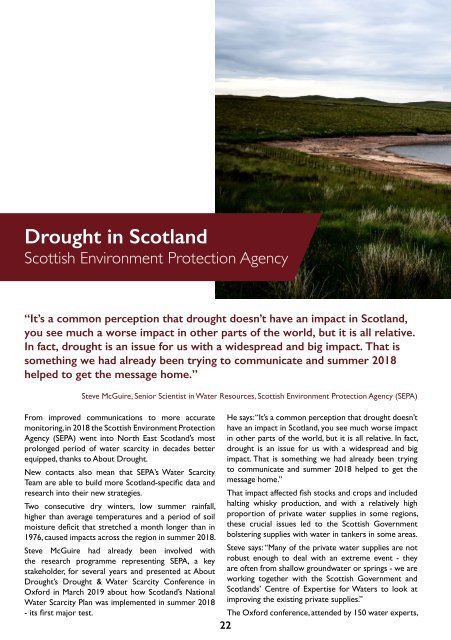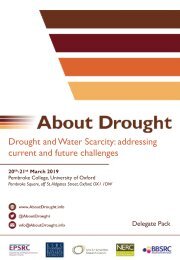About Drought Handbook: Outputs & Impacts
As the UK’s £12m Drought and Water Scarcity (DWS) research programme reaches its conclusion with a final event at The Royal Society in London, this handbook draws together the key outputs and outcomes. The book also features a series of interviews with our leading stakeholders, which highlight how successfully we have met our objectives to produce cutting-edge science that has made a demonstrable impact on how decision-makers manage water scarcity in the UK.
As the UK’s £12m Drought and Water Scarcity (DWS) research programme reaches its conclusion with a final event at The Royal Society in London, this handbook draws together the key outputs and outcomes. The book also features a series of interviews with our leading stakeholders, which highlight how successfully we have met our objectives to produce cutting-edge science that has made a demonstrable impact on how decision-makers manage water scarcity in the UK.
- No tags were found...
You also want an ePaper? Increase the reach of your titles
YUMPU automatically turns print PDFs into web optimized ePapers that Google loves.
<strong>Drought</strong> in Scotland<br />
Scottish Environment Protection Agency<br />
“It’s a common perception that drought doesn’t have an impact in Scotland,<br />
you see much a worse impact in other parts of the world, but it is all relative.<br />
In fact, drought is an issue for us with a widespread and big impact. That is<br />
something we had already been trying to communicate and summer 2018<br />
helped to get the message home.”<br />
Steve McGuire, Senior Scientist in Water Resources, Scottish Environment Protection Agency (SEPA)<br />
From improved communications to more accurate<br />
monitoring, in 2018 the Scottish Environment Protection<br />
Agency (SEPA) went into North East Scotland’s most<br />
prolonged period of water scarcity in decades better<br />
equipped, thanks to <strong>About</strong> <strong>Drought</strong>.<br />
New contacts also mean that SEPA’s Water Scarcity<br />
Team are able to build more Scotland-specific data and<br />
research into their new strategies.<br />
Two consecutive dry winters, low summer rainfall,<br />
higher than average temperatures and a period of soil<br />
moisture deficit that stretched a month longer than in<br />
1976, caused impacts across the region in summer 2018.<br />
Steve McGuire had already been involved with<br />
the research programme representing SEPA, a key<br />
stakeholder, for several years and presented at <strong>About</strong><br />
<strong>Drought</strong>’s <strong>Drought</strong> & Water Scarcity Conference in<br />
Oxford in March 2019 about how Scotland’s National<br />
Water Scarcity Plan was implemented in summer 2018<br />
- its first major test.<br />
He says: “It’s a common perception that drought doesn’t<br />
have an impact in Scotland, you see much worse impact<br />
in other parts of the world, but it is all relative. In fact,<br />
drought is an issue for us with a widespread and big<br />
impact. That is something we had already been trying<br />
to communicate and summer 2018 helped to get the<br />
message home.”<br />
That impact affected fish stocks and crops and included<br />
halting whisky production, and with a relatively high<br />
proportion of private water supplies in some regions,<br />
these crucial issues led to the Scottish Government<br />
bolstering supplies with water in tankers in some areas.<br />
Steve says: “Many of the private water supplies are not<br />
robust enough to deal with an extreme event - they<br />
are often from shallow groundwater or springs - we are<br />
working together with the Scottish Government and<br />
Scotlands’ Centre of Expertise for Waters to look at<br />
improving the existing private supplies.”<br />
The Oxford conference, attended by 150 water experts,<br />
22




